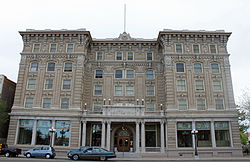
Pueblo is the Home Rule Municipality that is the county seat and the most populous municipality of Pueblo County, Colorado, United States. The population was 106,595 in 2010 census, making it the 267th most populous city in the United States and the 9th largest in Colorado. Pueblo is situated at the confluence of the Arkansas River and Fountain Creek, 112 miles (180 km) south of the Colorado State Capitol in Denver. The area is considered semi-arid desert land, with approximately 12 inches (304.80 mm) of precipitation annually. With its location in the "Banana Belt", Pueblo tends to get less snow than the other major cities in Colorado.
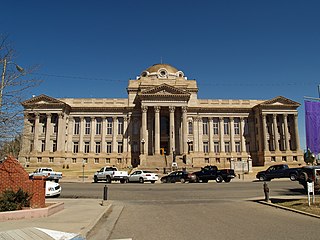
Pueblo County is a county located in the U.S. state of Colorado. As of the 2010 census, the population was 159,063. The county seat is Pueblo. The county was named for the historic city of Pueblo which took its name from the Spanish language word meaning "town" or "village". Pueblo County comprises the Pueblo, CO Metropolitan Statistical Area.

The Town of Dolores is a Statutory Town in Montezuma County, Colorado, United States. The population was 936 at the 2010 census. It is one of three incorporated municipalities in the county.

Pecos National Historical Park is a United States National Historical Park in San Miguel and Santa Fe Counties, New Mexico. The park, operated by the National Park Service, encompasses thousands of acres of landscape infused with historical elements from prehistoric archaeological ruins to 19th-century ranches, to a battlefield of the American Civil War. Its largest single feature is Pecos Pueblo also known as Cicuye Pueblo, a Native American community abandoned in historic times. First a state monument in 1935, it was made Pecos National Monument in 1965, and greatly enlarged and renamed in 1990. Two sites within the park, the pueblo and the Glorieta Pass Battlefield, are National Historic Landmarks.
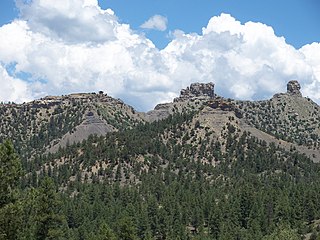
Chimney Rock National Monument is a 4,726-acre (1,913 ha) U.S. National Monument in San Juan National Forest in southwestern Colorado which includes an archaeological site. This area is located in Archuleta County, Colorado, between Durango and Pagosa Springs, and is managed for archaeological protection, public interpretation, and education. The Chimney Rock Archaeological Site has been listed on the National Register of Historic Places since 1970. U.S. President Barack Obama created Chimney Rock National Monument by proclamation on September 21, 2012 under authority of the Antiquities Act.

Yellow Jacket is an unincorporated community and a U.S. post office located in Montezuma County, Colorado, United States. The Yellow Jacket post office has the ZIP Code 81335.

The Lowry Pueblo is an Ancestral Puebloan archaeological site located in Canyons of the Ancients National Monument near Pleasant View, Colorado, United States. The pueblo was constructed around 1060 AD atop abandoned pithouses from an earlier period of occupation. It was occupied by 40 to 100 people at a time for 165 years. The site is one of the northernmost to be associated with the Puebloan cultures. The site was declared a National Historic Landmark in 1964.

The Cathedral of the Sacred Heart or Sacred Heart Church is a historic church located at 414 West 11th Street in Pueblo, Colorado. It is the mother church of the Diocese of Pueblo.

The First Congregational Church in Pueblo, Colorado is a Romanesque Revival style church building constructed in 1889. The building designed by Fred A. Hale and constructed in 1889 with Manitou sandstone includes a bell tower. It was added to the National Register of Historic Places in 1985.

The old First Methodist Episcopal Church, also known as First Methodist Episcopal Church, South, is a historic redbrick Southern Methodist church building located at 400 Broadway in Pueblo, Colorado. Designed by George W. Roe in the Romanesque Revival style of architecture, it was built in 1902. In 1939 it became the Trinity Methodist Church. Bought by the George F McCarthy Funeral Home in 1954, it is now the George McCarthy Historic Chapel and is used for funeral services.

The Henkel-Duke Mercantile Company Warehouse, also known as Charles Henkel & Co. Building or Montgomery Ward Warehouse, is a historic warehouse in downtown Pueblo, Colorado. The building once served as a wholesale grocery warehouse.

The Pueblo Federal Building is a historic government building in Pueblo, Colorado, built in 1897. The building serves as a federal courthouse and post office. It was listed on the National Register of Historic Places in 1978.

This is a list of the National Register of Historic Places listings in Pitkin County, Colorado.
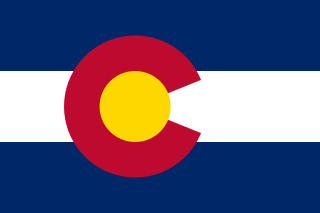
The following outline is provided as an overview of and topical guide to the U.S. state of Colorado:

The Pueblo City Park Carousel is a historic carousel in Pueblo, Colorado, United States. Built in 1911, it is a Parker #72 /Stein & Goldstein carousel. Its horses are believed to have been carved circa 1907. In 1983, it was listed on the National Register of Historic Places, and it is currently owned by Pueblo City Park.

Avondale Bridge was located in Avondale, Colorado spanning the Arkansas River. It is listed on the National Historic Register of Places. It was a Luten Arch bridge built by the Pueblo Bridge Co.. It was replaced in 2005.

The Union Avenue Historic Commercial District is a century-old business district in Pueblo, Colorado, United States. The district comprises sixty-nine contributing properties in a total area of 27 acres (11 ha) including the Union Depot, Vail Hotel and Quaker Flour Mill. In 1983, the district was listed on the National Register of Historic Places. The historic district was originally located within South Pueblo and Central Pueblo, two small cities until incorporated into Pueblo, Colorado which combined South Pueblo, Central Pueblo, Pueblo and Bessemer into one municipality. While still South Pueblo, Bat Masterson, best known for his association with Wyatt Earp and Doc Holliday was brought in as sheriff to protect a railroad that was being built.
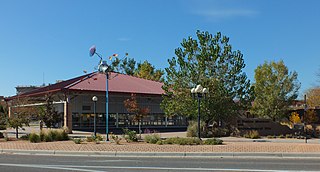
El Pueblo History Museum is a local history museum in Pueblo, Colorado, United States. The museum presents the history of Pueblo, together with the cultural and ethnic groups of the region. The historical site includes an 1840s-style adobe trading post and plaza and the archaeological excavation site of the original 1842 El Pueblo trading post which was listed on the US National Register of Historic Places in 1996. The facility is administered by History Colorado.
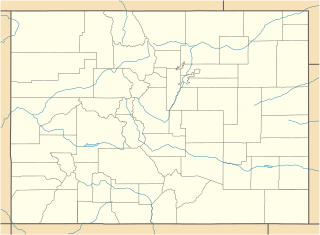
El Pueblo, also called Fort Pueblo, was a trading post and fort near the present-day city of Pueblo in Pueblo County, Colorado. It operated from 1842 until 1854, selling goods, livestock, and produce. It was attacked in 1854, killing up to 19 men and capturing three people. A recreation of the fort is located at the El Pueblo History Museum at the site of the original fort.
